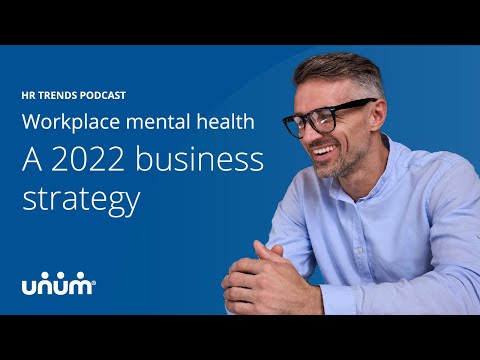Workplace Mental Health: A 2022 Business Strategy

(upbeat music) - Mental health, workplace stress, productivity, the great resignation. These are top of mind issues for employers as we enter 2022. In our newest podcast episode, we are speaking to two business leaders and behavioral health experts about why investing in behavioral health is not just a good idea, it's a critical business strategy for now and the future.
- It's a huge strategic opportunity for employers to demonstrate genuine and authentic caring. - And the savvy business person is going to understand that, if they're going to be successful, they have to pay attention to this. Taking care of your staff, your employees is so important. (upbeat music) - [Claire] Welcome to HR Trends. I'm your host, Claire Morin. Happy New Year.
This is our first podcast of 2022, and we are bringing in two CEOs to discuss behavioral health. Why it's such a business priority this year and beyond. We have two extremely accomplished guests with us. Dr. Arthur Evans is the CEO of the American Psychological Association.
APA promotes and disseminates psychological knowledge to benefit society and improve lives, a mission consistent with Dr. Evans' life work. He previously served in public policy positions as Commissioner of the Department of Behavioral Health and Intellectual Disability Services in Philadelphia, and as Deputy Commissioner for Mental Health and Addiction Services in Connecticut. His career has centered around equity and social justice, and his work has been nationally and internationally recognized, including multiple awards named for Reverend Martin Luther King Jr.
So welcome, Dr. Evans. - [Arthur] Thank you, and I'm glad to be here. - [Claire] We also have Andrew Mueller, Chief Executive Officer of MaineHealth, a not-for-profit integrated health system consisting of nine local hospital systems, a comprehensive behavioral health care network, diagnostic services, and home health agencies. With more than 22,000 employees, MaineHealth is the largest health system in Northern New England. Prior to MaineHealth, Dr. Mueller has led numerous other healthcare organizations.
He's also served in the Air Force as a staff family physician and flight surgeon. He's got a really innovative and compassionate approach to leadership that draws on this breadth and depth of experience, both as a practicing physician, a physician executive, and as a veteran. So welcome, Dr. Mueller. - [Andy] Hey, it's great to be here with you today. - [Claire] So glad you could both be with us 'cause we are talking what was one of the, if not the most important topic of 2021. We're recording this on December 8th, and we very much, we're releasing this at the beginning of January because we very much feel this is the, again, probably one of the most important challenges for employers in 2022, if not the coming decade or so.
So Dr. Evans, or Arthur, I'm just gonna call you Arthur, In the APA's report, you do so many reports. I know in your compounding pressure on the American Workforce Report, you were showing stats like 79% of employees saying they're experiencing some work-related stress in the last month. You've also been speaking about how people in the US reporting anxiety or depression three to four times more than pre pandemic levels. So as we go into 2022, what are you seeing? What are you predicting of what employers can expect this year? - [Arthur] Yeah, well, thank you for allowing me to be here. You know, when the pandemic started, one of the things we did is, we predicted what was going to happen.
By just looking at the kind of stressors that people were experiencing, we saw not only the uncertainty, which we know contributes to psychological distress, we know that the kind of fear that was happening, we know that taking away people's social support was going to lead to increase psychological needs. And what we're seeing now is that that tsunami that we were predicting is on our doorsteps, and some of the data that you cited really illustrates that. I think for employers, what they have to understand is that that tsunami is here now, and so, people in their workforce are experiencing high levels of stress. They have to understand that it's affecting a large proportion, as you mentioned. We know from CDC and other data and our own survey, we do a Stress in America survey, that a large proportion of people are reporting work-related stress, and they have to recognize that this tsunami is going to have a long tail.
This is not gonna go away simply because the pandemic is over. We're not out of it yet. But even when we're out of it, we're still going to have a significant number of people in our population who are having challenges. So I think employers just have to be aware of that, and they have to understand the relationship between that stress that their employees are experiencing and the number of negative outcomes for them as employers. High rates of people leaving their organization, people having decreased ability to concentrate.
All of those things affect, not only the health and of their employees, but it also affects their ability to accomplish their mission. - [Claire] It's so helpful to hear that from you, and Andy, I would love to pivot over to you. So as a CEO, somebody who's leading their organization, particularly in the healthcare that we all know is the front line of this pandemic.
Any thoughts on what Arthur just mentioned? - [Andy] Yeah, no, we are certainly seeing it as an organization. We're certainly seeing it as a healthcare industry right now. And, you know, we know from data in the military that those that were subjected to traumatic events in combat typically didn't start to see some of the signs of the anxiety and stress and other behavioral health illnesses associated with that stressful event until 18 months after the stress originally occurred. And so, when you stop and think about it, we're effectively a little over 18 months into the global pandemic and all that has transpired in our society over 2020, so it should be no surprise that right now we are seeing incredible demand for behavioral health services as a healthcare organization, but we're also seeing the impact on our frontline care team right now as well. And so, we expect that this is only going to continue.
And the reality is, is that over the course of the last two years, we have continued to see just additional waves of what I would describe as traumatic events on us, whether it was the original wave of the pandemic, whether it was social unrest, whether it was controversies around whether to get vaccinated or not, whether it's been the Delta wave that has now hit. So we really ought to be able to look ahead and know that we're gonna continue to see waves of this occurring for the foreseeable future. And so, if you're running a business today, you need to recognize that we're not gonna be through this in February. We're not gonna be through this in July. This is gonna go on for years.
And if you're not thinking that long-term about this, then your workforce is not only going to struggle, they're gonna be suffering. And so that's why, as leaders, it's so critical that we invest ourselves in thinking about their state of mind as they continue to do the things that they need to do to care for patients, support customers, deliver products, all of the things that are gonna be important for us to continue to survive into the future. - [Claire] It's so helpful hearing that perspective from the military. Obviously, you were a veteran, you were there, you experienced this. 'Cause I think for many of us, perhaps there was that shock of why is it now that it's really hitting people? And that's those delayed effects.
And I want us to get to that, how can employers really prepare, right, for the future? But before we do, Arthur, I wonder if I could bring it back to you just to pick up on what you said around that correlation between work stress and retention, right? Because obviously, the great resignation is a big issue right now for HR, and everyone's trying to get a handle on that. I know in some of your data, you have the startling statistic. Could you speak about that, Arthur? I think it was something about 71% of those who are typically stressed at their jobs report they intend to seek employment outside the organization versus only 20% of people who don't typically feel stressed.
So that really shows, like nearly three times as many, if you're stressed, you're three times more likely to be looking for another job. - [Arthur] Well, you got the statistics exactly right. You know, our survey showed that you're three times more likely to leave the workplace if you are one of those people who are experiencing significant stress. And so, to Andy's point a little while ago, this is a business imperative. This is not a good thing to do now.
I'm a psychologist, so I believe it is a good thing to do, and I value it, but even if you don't have those values, if you're a business person, you have to understand what this is doing to your workforce, and then what you need to then do to respond to that. So I think that the issue that employers have to understand is that we are wonderfully designed to avoid pain, and when we are experiencing high levels of stress, it is painful, it's uncomfortable, and people are going to find a way to get relief. The great resignation I think is just an example of that. People are saying, if you going to put me back into a high stress environment, or if you're gonna put me back against my wheels since I've been working virtually now, and now you're gonna force me back into being in this environment, I'm not gonna do it. I'm going to find another way because my own health is more important.
So there is this very strong correlation, and employers who pay attention to it, I think are gonna have a competitive edge in the future. - [Claire] It's brilliant and so true. Andy, could you talk through maybe a few elements? What does MaineHealth do? What did you do as a leader to address this? It'd be really helpful just to hear.
- [Andy] Yeah, I think there are a couple of things. So first and foremost, you have to invite the conversation around this. You have to help share with your organization that it's not only okay to talk about this, it's necessary to talk about where people are at in terms of their state of mind in the moment and recognize that it is normal as human beings to have gone through what we had gone through for the last two years to feel feelings of being overwhelmed and feeling stressed and sometimes feeling a little bit, you know, lacking hope around the future. And at some point, all of those signs and symptoms can get to the point that it inhibits your ability to effectively do your job, to interact well with others, and in some cases, to take care of yourself.
And so, talking about those things openly, sharing with other leaders and frontline caregivers around what are the things that they need to be looking for in their friends and colleagues, helping them with ways to supportively engage in those conversations. And frankly, as leaders, being vulnerable to talk about our own struggles with these things in the moment and having the courage to talk about how we're doing with these things, how they can impact our ability to make good decisions, and how we as leaders and leadership teams are checking in with each other around these really important matters is clearly important. And then making sure that the support and the resources are there to help the team. And so, we have done a lot of work, both in expanding the support services that are available for front line. We're in the process now of making a large investment, two and a half million dollars in additional behavioral health support, including more psychologists on the ground, near the front lines to be available to work with our front lines. But in the process off building this program that we intend to roll out early next year, we've also recognized that individuals in our organization are not already taking advantage of what exists.
And so, really making sure that everyone in our organization is aware of the existing support that we already have available to them, encouraging its use, listening to your teams around what can be done to make those resources more available, more convenient, and more accessible are all things that I think are critically important right now. - [Claire] So helpful. Arthur, you're also obviously a CEO. You're not only leading psychologists and leading, but you also are a CEO. Anything you were to add to that? - [Arthur] No, I think Andy is exactly right in everything that he said.
I think that that thinking about this issue from the standpoint of what kind of organization do you have, where you are really recognizing and CEOs and C-suite leaders are setting the tone around these issues. We talk about there's this new, it's not a new, but an emerging idea in our field called population health. It's been around for a while, but we're starting to really think about mental health that way. Historically, our field has only focused on people after they have a diagnosis, after they're in crisis, and the problem with that is obvious, that we've missed this opportunity to intervene much earlier.
And so, our field is starting to look at the whole population of what are the needs across the continuum of need, not just the people who are at the deep end who have problems. That's, first of all, a more humane way for us to operate because we are preventing even as we are treating, but it is also more cost-effective to do that. And one of the ways that we are promoting and have been for a number of years is a notion of a psychologically healthy workplace.
If you can have a toxic work environment, you can also have a healthy work environment. And I think every HR professional out there, every CEO ought to be asking themselves, what kind of environment do I have? Is my environment promoting the psychological wellbeing of my staff, or is it working against that? And we have, if I could just name a few of the dimensions that the research says are correlated to having a more psychologically healthy workplace. One of them is just having more employee involvement. We know from a lot of psychological literature that one of the things that contributes to stress is people feeling like they don't have control. So the more control that you can give people, the more employee involvement, that's going to reduce the distress that people are experiencing.
Work-life integration. You know, I mentioned earlier that a lot of people are leaving because they feel like they're being forced back into the work environment. Well, people have now experienced this ability to have more control over their lives and actually have better life experiences because they have the flexibility to work virtually.
Well, you know, that's just one dimension. There are other ways that we can help people to have better integration with work. Employee growth and development. How are you investing in your staff? Are you doing things to promote their development? Work, I'm sorry, health and safety. Are you paying attention to and giving a strong signal? I think one of the things I'm most proud of as CEO where we've done pulse surveys throughout the pandemic just to see how our staff were doing.
And the last one that we did, I was actually surprised at the level of job satisfaction that our employees had. And one of the things that they cited was that they felt that we cared about their health and safety. And the reason that I think that that was rated so highly is that every single message that we made during the pandemic started with our decisions are being made based on what we believe is in the best interest of your health and safety, and then we would talk. And so they got that message reinforced. And so organizations that pay attention to that are gonna be places where your employees are gonna feel more comfortable. And just a couple of other areas, employee recognition, and also having really clear and consistent communication.
So if employers are trying to build those kinds of things into the culture of their organization, they're much more likely to have the kind of place where you're not experiencing high levels of psychological distress. And to Andy's point, which is the other part of this, which is not only do you wanna create that environment, but you also wanna make sure that when people do need those services, that they are available. Many employers, because they are so large, they don't have to follow some of the parity laws because they self-insure, but every employers should make sure that there's parity between their physical health benefits and their behavioral health benefits, and that they have an adequate network of services so people can access those services upon demand. - [Claire] Thank you so much. That was so helpful to hear. I know, obviously here at Unum, we're very much involved in this too, to that point of, you know, being a large disability insurance provider and many claims due to behavioral health issues.
So to get in early, that preventative, getting those tools, you know? (indistinct) probably one of our great leaders, she speaks on this a lot, and she was actually speaking to both of you on a great webinar we'll link to in the show description. So if you want more, but I wanted to thank you both so much. This is clearly a huge topic. Going into 2022, it's gonna continue to be that way. I wonder if we could finish just with some words of encouragement from you both.
Maybe, Andy, starting with you. What would you kind of, any advice or best practice, or just a key message you'd share with employers or peers? - [Andy] Yeah, you know, this is such an important topic, and it is gonna be continue to be key for executing on business strategies for the foreseeable future. But as Dr. Evans alluded to,
it just really is the right thing to do to care for our people right now. And at a time in our society where people are feeling less cared for and about, this is a huge strategic opportunity for employers to demonstrate genuine and authentic caring as a retention, as a recruitment, as a development opportunity. And so, you can do great for your business and do great for your people at the same time by focusing on this topic for the foreseeable future. - [Claire] Wonderful. Arthur, any thoughts from you? - [Arthur] Well, Dr. Mueller stole my thunder. He said exactly what I was going to say.
You know, it's rare that you do an interview and you're just so on the same page with your colleagues, and everything he said, I'm sitting there nodding, going yes, exactly that. You know, I do think it's the tone that leaders set in the organization and valuing this issue. I was so glad that Dr. Mueller talked about the military
because there's sometimes this idea that behavioral health or mental health is something that's nice and soft, it's critical to mission, to accomplishing your mission. And the savvy business person is going to understand that if they're gonna be successful, they have to pay attention to this. Taking care of your staff, your employees is so important. And the behavioral health aspect, which, you know, I started with just talking about where we are and what's happening in the workforce, employers understanding that, understanding that this is gonna have a long tail, but most importantly, the big take home message here is that we can do something about it. We don't have to be passive players in this. If we create work environments that are supportive of people's health, making sure that they have access to services when they need them, that it can make all the difference in terms of how your employees are doing, and so that's what I would like to leave people with.
- [Claire] Well, thank you both so much for being with us today. Such a useful, practical conversation. Really inspiring. And wishing everyone in our audience a happy New Year.
Thank you for listening. Stay with us through 2022 as we continue to talk to experts to find out how HR can even serve its organizations even more profoundly. So thank you both so much, and see you soon. (upbeat music) So tune in to our first HR Trends episode of 2022, and don't forget, subscribe on your favorite podcast app.
2022-01-23 01:50


